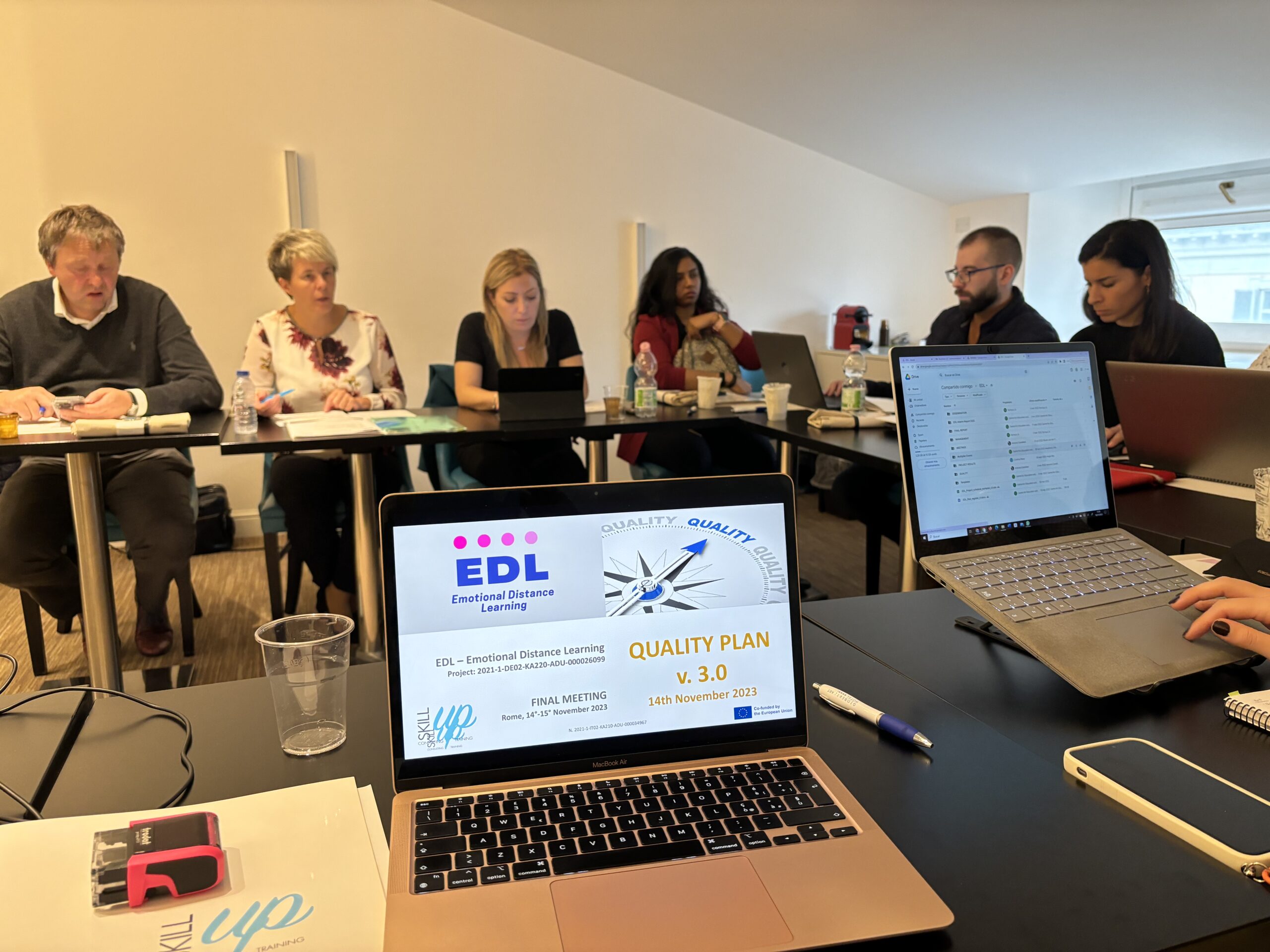By Maria Chiara Di Francesco – Skill Up
On October 25th the Skill Up team organised its “Emotional Distance Learning” Multiplier Event in Morlupo (Rome, Italy), with the assistance of the high school “IIS Margherita Hack”, a long-time collaborator of the EDL Italian team.
The event was held during the European Vocational Skills Week in the Year of Skills 2023. Even though the Week of Skills is mainly intended for the VET sector, we felt it was the ideal thing to do, to reach an inter-sector objective at the end of a project designed to support teachers in their online practice.
While reaching the end of a project can feel bittersweet, there is a certain amount of pride and satisfaction in being able to show the final results of two years of hard work and dedication to the target audience of EDL.
The 33 participants were led to reflect on the meaning and value of emotions and how emotions shape our behaviours.
At the beginning of the Event, all participants were asked to describe their emotional state with three words. Naming emotions and emotional states is a fundamental step in acquiring awareness and developing emotional intelligence. We cannot manage what we don’t acknowledge and what we don’t recognise, and giving emotions a name, extrapolating them from the magmatic substrate of how we feel, is essential in assessing what it is, precisely, that we are dealing with. There is power in names.
After a day at work, participants were tired and hungry; some were stressed or sleep-deprived, or overwhelmed, but some also felt interested, relaxed, entertained, and proud.
What followed was an assessment of the why’s. Why is it that feel a certain way? What is it that makes us tired, or stressed, or entertained? While feelings are instinctual in the measure that we cannot control the intensity and quality of the emotions that come to the surface, they are never unexplainable or irrational; there are why’s, where’s, when’s, what’s, and who’s, that can be traced back to the way we feel, and that helps us understand our reactions and, ultimately, who we are. Individuating the sources of our feelings connects us with the most authentic part of our being, teaching us many lessons about what we hold dear, our core values, our triggers, and what lies under the surface.
Effects are just as important in understanding the link between feeling and behaviour. Effects create a pattern: when a trigger (source) happens, we feel a certain way, and in response, we behave in a certain way. When the same source creates the same trigger, and the same feeling leads to the same behaviour, we experience a pattern. This is an infallible method of self-awareness, as recognizing our patterns allows us to change them, or to prevent their unpleasant effects from happening.
Effects, the participants agreed, are often at the basis of our conception of “positive” and “negative” emotions: emotions that tend to hurt us, or hurt others, are considered negative, and therefore avoided, or stigmatized. Yet this is a short-sighted way of approaching emotions: as natural reactions to triggers and causes, emotions are never inherently bad or good. They just are. It’s their effects that we come to fear, especially when we find ourselves in the impossibility of controlling them. Anger tends to be the most stigmatized emotion of all, as it can be particularly disruptive. Yet even anger is a coherent reaction to a trigger, and often a secondary one to either fear or hurt.
Fear of the effects of emotional states can lead -and has led- to the belief that the optimal state of the mind is an absence of emotions. From Greek and Roman stoicism to Medieval asceticism, to the Enlightenment idea of men as purely rational and mental beings, freedom from emotions in the name of tranquility and supposed heightened wisdom seems to have been the aim of a consistent line of thinking in Western philosophy. This has created a dichotomy between thought and emotions, a dichotomy illustrated by Jung’s studies on identity and personality, and still present to this day in our approach to the world. Not only do we find it difficult to reconcile thinking and feeling as aspects of the mind and of human nature, but we have associated specific categories and therefore values to these two mental activities. Thinking and rationality are regarded as positive, and are the typical features of men, adults, and of leaders, as our social power structure resembles the one of the human body, ruled by the brain; feelings and emotions are characteristics associated with children and with women, categories considered weaker and unfit to lead.
Still, emotions are a fundamental and original part of who we are, as a species and as individuals. We can suppress them, but we cannot avoid them. The real question, and the aim of Emotional Intelligence training, is: how do we manage them? And how do we manage them in the workplace?
This are the questions that lie at the heart of the “Emotional Distance Learning” project. And to this question, we have answered with an EDL platform, that the Italian team presented to the public during the event, on which the audience can find modules and tools to learn how to manage emotions such as tiredness, frustration, anger, loneliness, dissociation and fear while adapting to the mode of online (and offline) teaching and learning.
Presenting the final result of the project to the target group was a proud moment for the Italian team, which will host the Final Event for EDL in Rome on November 14th. Upon concluding the presentation, every participant exhibited a deep appreciation for the EDL project’s contents and expressed excitement about gaining new insight into their learning style, which incorporates emotions as an essential component of their being and behaviour.



0 Comments